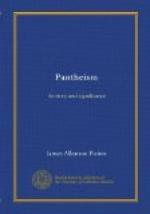[Sidenote: The Church Fathers.]
[Sidenote: Augustine.]
The orthodox Christian fathers were not less conscious than the Neo-Platonists or Gnostics of the perennial problem of the Many and the One. But they were restrained, perhaps, by the “faith that comes of self-control,” perhaps by mere common sense, from indulging in attempts to connect the Infinite with the Finite by “vain genealogies.” Indeed, for the most part they confessed that whatever light the Gospel might shed on moral issues, it left untouched the ultimate question of the relation of the Infinite to the Finite. And the only aspect of their most venturesome speculations which I need recall is their insistence, even when apparently verging toward Pantheism, on a transcendent as well as an immanent God, that is on a Creator existing, so to speak, outside the Universe and apart from it as well as permeating every part. Thus, for example, Augustine would seem to deny to the world any separate creature existence when he says, that but for the divinity everywhere in it, creation would cease to be. But in his insistence on the creation of the world from nothing, he directly contradicts Pantheism, because he must necessarily be taken to mean that there is now something other than God.
That there have been devout Christians whose mystic speculations on the relations of the soul to the Eternal logically involved Pantheism—if logic in such a case had any function—there can be no doubt. But for most of them “God’s word written” seemed to confirm God’s word in heaven and earth as known to them, proclaiming that there had been a beginning and there must be an end. Therefore, whatever might be the immanence of the Creator in His works, God could not, in their minds, be identified with “the fashion of this world” which “passeth away.”
Yet the time was coming when the Divine word both in Scripture and in Nature was to be otherwise read. For men began to learn that the Bible was other than they had supposed and the Universe immeasurably greater than they had conceived.
FOOTNOTES:
[Footnote 12: De Mundi Opificio, p. 5B. I take him to mean by [Greek: kosmos noetos]—the world as apperceived—realised in our consciousness.]
[Footnote 13: It should be noted that Philo, who was contemporary with Jesus, often uses the title “the Father” [Greek: ho Pataer] as a sufficient designation of the Eternal. It was not very usual, and is suggestive of certain spiritual sympathies amidst enormous intellectual divergencies between the Alexandrian philosopher and the Galilean prophet.]
[Footnote 14: See Col. i. 15-17 and refs. John i. 1-3; iii. 13; viii. 58.]
CHAPTER III
MODERN PANTHEISM.
[Sidenote: Spinoza.]
[Sidenote: A Pantheistic Prophet.]




